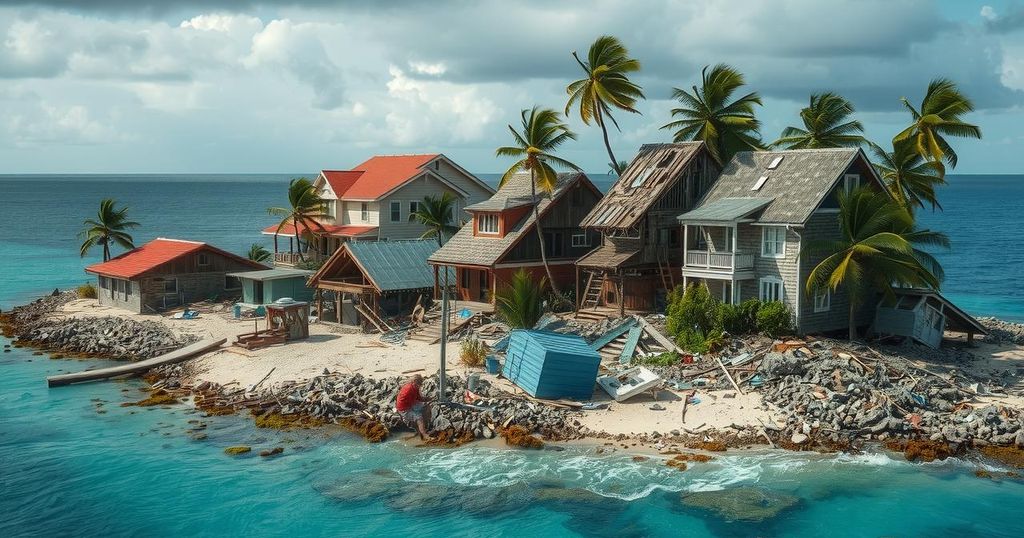World news
AFD, AFRICA, BELGIUM, CHI, CLIMATE COUNCIL, EMERGENCY RESPONSE, ESTE, ESTELLE YOUSSOUFFA, EUROPE, EUROPEAN COMMISSION, FRANCE, FRENCH DEVELOPMENT AGENCY, HURRICANE BERYL, IDA, ITALY, KENNETH, NATURAL DISASTER, NATURAL DISASTERS, NORTH AMERICA, SWEDEN, UNITED STATES
Marisol Gonzalez
0 Comments
Cyclone Chido: Mayotte Faces Unprecedented Destruction and Humanitarian Crisis
Cyclone Chido, a powerful Category 4 storm, devastated Mayotte in December, causing widespread destruction and claiming at least 35 lives. The storm is noted as the worst to strike the region in 90 years, leaving communication systems down and areas inaccessible. In response, the European Commission and several countries are providing emergency aid to assist recovery efforts amid growing concerns about climate change’s role in increasing storm severity.
Cyclone Chido, classified as a Category 4 storm, recently inflicted unprecedented destruction upon the French archipelago of Mayotte in December, marking the most severe cyclone to impact the region in nine decades. With wind speeds reaching 136 miles per hour, the cyclone obliterated neighborhoods, schools, and hospitals, resulting in a death toll of at least 35 individuals, with fears that the number may escalate further. The aftermath left vast areas of Mayotte inaccessible due to widespread power outages and communication failures.
Estelle Youssouffa, a member of parliament representing Mayotte, emphasized the dire situation, stating, “We must not confuse the villages that are cut off from communication… and the shanty towns, where there is very little chance of there being survivors. Everything has been razed.”
The significance of the devastation wrought by Cyclone Chido is underscored by the region’s prior encounters with extreme weather events and its vulnerability to climate change, which amplifies the frequency and intensity of such storms. The French Development Agency’s strategic plan acknowledges Mayotte’s susceptibility to the impacts of rising global temperatures, raising concerns about future calamities.
In response to the crisis, the European Commission and various nations, including Belgium, Germany, Italy, and Sweden, have extended emergency assistance to the affected communities. The EU’s Copernicus Emergency Management Service has been instrumental in creating detailed maps to facilitate relief efforts. Mozambique is also set to receive approximately $1 million in humanitarian aid, targeting necessities such as water, shelter, and healthcare.
With climate change contributing to increasingly severe weather events, the importance of transitioning to renewable energy sources becomes paramount to safeguard vulnerable regions and mitigate the effects of future natural disasters.
The article discusses the recent impact of Cyclone Chido on the French archipelago of Mayotte, situated off the east coast of Africa. The cyclone, categorized as one of the most powerful storms in the area in nearly a century, has devastated local communities, leading to significant loss of life and property. The region’s vulnerability to extreme weather events is exacerbated by the effects of climate change, which is becoming increasingly concerning for humanitarian efforts and disaster preparedness.
In conclusion, Cyclone Chido’s devastating impact on Mayotte serves as a stark reminder of the growing threat posed by extreme weather exacerbated by climate change. The loss of life and extensive damage underscores the urgent need for effective relief strategies and a commitment to transitioning to sustainable energy solutions. It is crucial that local and international efforts continue to support the affected communities as they begin to recover from this calamity.
Original Source: www.thecooldown.com




Post Comment